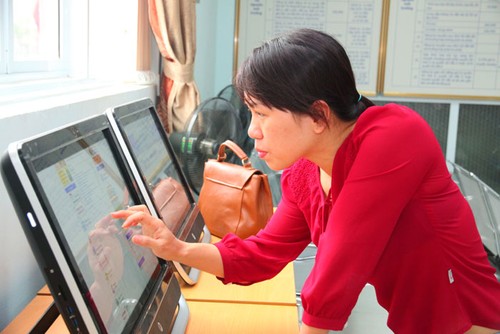 A woman in Bac Tu Lien precint checks for administrative procedures on computer. (Photo: Thai Hien/Hà Nội Mới online newspaper) A woman in Bac Tu Lien precint checks for administrative procedures on computer. (Photo: Thai Hien/Hà Nội Mới online newspaper) |
Building an e-government is a strategic task in modernizing Vietnam’s administrative apparatus to meet the needs of the public, particularly the business community. Vietnam has set the 2019-2025 period for building an e-government with improved efficiency and service quality for the public. Vietnam aims to develop a digital government, economy, and society that ensures information and cyber security.
Building a steering system from the central to local level
On March 7th the government issued Resolution 17 on key tasks and solutions for e-government development in 2019 and 2020 with an orientation to 2025. The National Committee on E-government is headed by Prime Minister Nguyen Xuan Phuc. E-government Steering Committees of ministries, sectors, cities, and provinces have been established.
Minister and Head of the Government Office Mai Tien Dung said: “Government leaders are determined to grasp the benefits of a digital economy and society. We’ve learned lessons from other countries in building e-government and have had some initial success.”
The legal framework for an e-government is being fine-tuned and some systems have been put into operation, including the National Document Axis for sending and receiving e-documents within state administrative agencies, the information system for government meetings and internal work, and key components of the National Public Service Portal.
Software application
Those three systems are important steps toward a paperless government. They will save time and tens of millions of USD.
Prime Minister Nguyen Xuan Phuc said: “Software applications save the administrative expense and time of processing documents. Leaders can use the applications to give prompt direction and improve their management. The National Document Axis from central to local level can ensure smooth direction from the central government and the Prime Minister to local administrations.”
Vietnam’s progress in building an e-government has been hailed by the international community. Russia’s Deputy Minister of Digital Development, Communications and Mass Media, Mikhail Mamonov, praised Vietnam’s efforts to raise its e-government development index. Russia wants to cooperate with Vietnam in human resource training for IT and cyber security. Ki Byoung Kim, Head of the global e-government section of South Korea’s Ministry of Security and Home Affairs, applauded Vietnam’s determination to build an e-government.